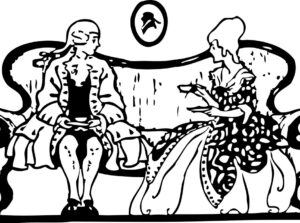This month I look again at the fascinating ways in which men and women are different. I highlight three cognitive and psychological differences that, if understood, can improve relationships. The distinctions I make are generalities, but you can apply them to your relationships and see if they make sense to you.
Difference #1. Men tend to be solution-oriented. Women tend to be process-oriented.
This difference comes shining forth when a problem arises, whether it is in the relationship or outside the relationship. Let us say that one partner is having a problem at work. The male’s first response is to look for a solution. What are the options? What does he think is the best option? He puts on his thinking cap and tries to figure things out. The woman, by contrast, often wants to talk about the issue, be listened to, and work through it by talking. A woman is less concerned initially about figuring out a solution. She does not want to think right away about what to do—or worse yet, be told what to do.
This difference leads to countless misunderstandings. The man does his best to help the relationship or his partner by coming up with a solution and telling her what she or they could do. The woman is frustrated that he will not simply listen to her while she processes her thoughts and feelings by talking.
Difference #2. Men can focus on one thing intensely. Women tend to be able to multi-task better.
Men can have an incredible ability to concentrate on whatever they are mentally involved in—whether it is a work task, a home improvement project, or simply watching TV. They essentially have “one-track minds.” Women on the other hand often seem able to juggle two, three, or four things at once—for instance, getting themselves ready, while they get the kids ready, and while they answer a question from their husbands.
 This difference may come from how men’s and women’s brains vary. The corpus callosum, which connects the two hemispheres of the brain, is larger in women. Women can send more signals back and forth between the two halves of their brains at the same time, and therefore can carry on more tasks at once. Men, on the other hand, are able to concentrate in one half of their brains more intently and utilize its powers in great depths.
This difference may come from how men’s and women’s brains vary. The corpus callosum, which connects the two hemispheres of the brain, is larger in women. Women can send more signals back and forth between the two halves of their brains at the same time, and therefore can carry on more tasks at once. Men, on the other hand, are able to concentrate in one half of their brains more intently and utilize its powers in great depths.
This difference also can lead to difficulties in relationships. If the man is concentrating on something, whether it is reading or doing a home task, the woman may believe he is ignoring her when she begins to speak to him. At some level, he truly does not hear her. She wonders how he can be so unaware of what is going on around him. It is wise to remember that a man can require a moment akin to waking up when he is called on to shift his focus.
Difference #3. Partners often struggle with contrasting feelings of inadequacy and of abandonment.
This difference is not gender-based, but I include it because people frequently find a partner who has a complementary insecurity to their own. It can lead to a cycle of conflict that erodes a relationship. If a man has issues of not feeling good enough, he may pair with a woman who fears people leaving her. Or vice versa.
This troublesome pairing sets up an unfortunate dynamic when conflict arises. If one partner feels attacked, it may trigger his or her feelings of inadequacy, and they shut down. When this partner shuts down, the other person feels abandoned. He or she may protest in some fashion, because he or she wants to avoid feeling abandoned. The protest only makes the other partner feel more inadequate, so he or she withdraws further. The other partner feels more abandoned. So the cycle continues.
A similar cycle occurs, if the person who has underlying feelings of inadequacy reacts angrily or defensively, because this can also feel like the relationship is in danger or that the person is not listening. The person with underlying feelings of abandonment may react by pushing even more on the person who feels inadequate. Again, the cycle continues.
The way out of these cycles is to tell oneself that relationship strife does not mean one is inadequate, nor does it mean that your partner is abandoning you.
So there you have it, three more differences between men and women. Men tend to be solution-oriented and be able to focus on one thing intensely. Women tend to be process-oriented and be able to multi-task well. And both sexes often pair with partners who have contrasting inadequacy or abandonment issues that trigger each other and cause a conflict cycle.
I hope you find these fascinating differences helpful in understanding yourself and your partner, and in negotiating your relationships better. This is Glenn Stevenson with Self Sense Counseling and Coaching. Until next month, I say once again, “Vive la différence!”